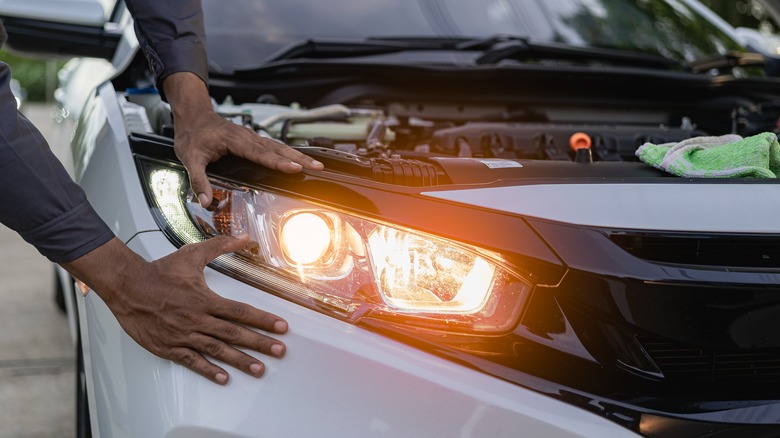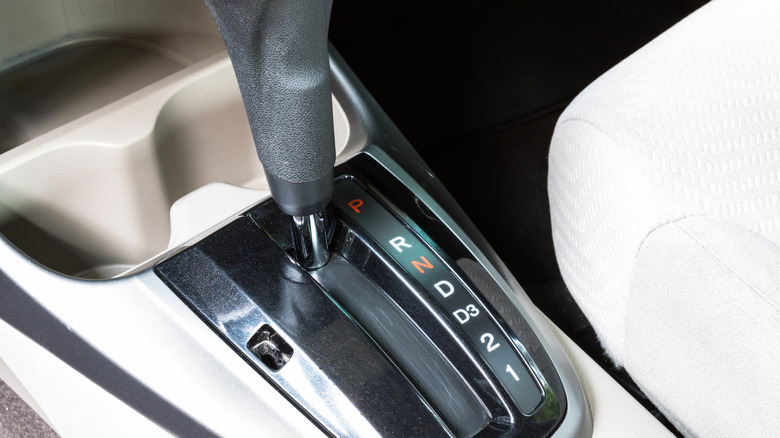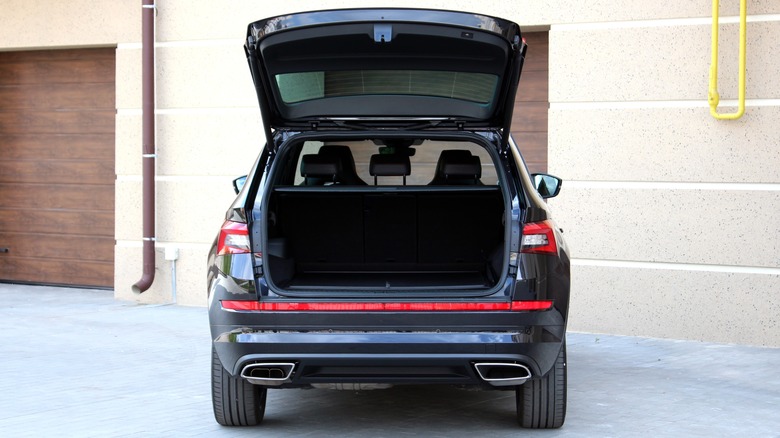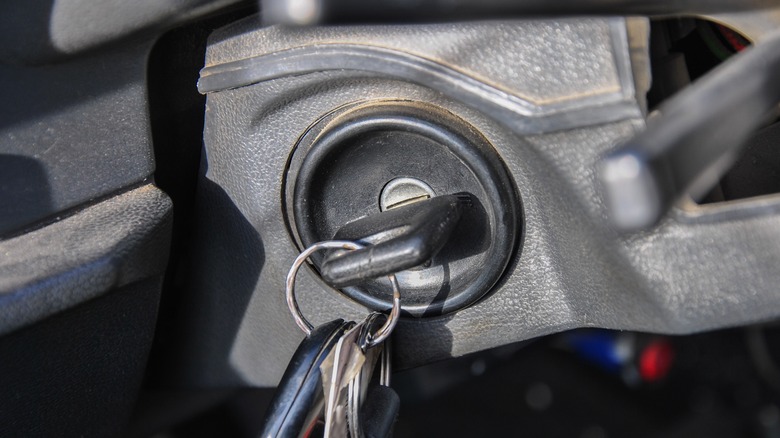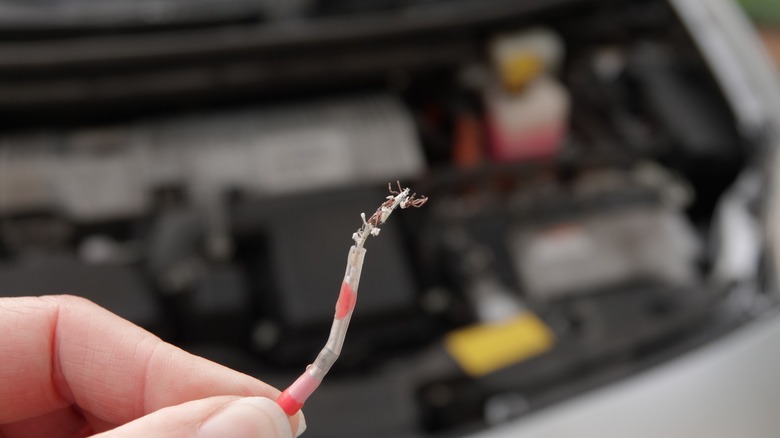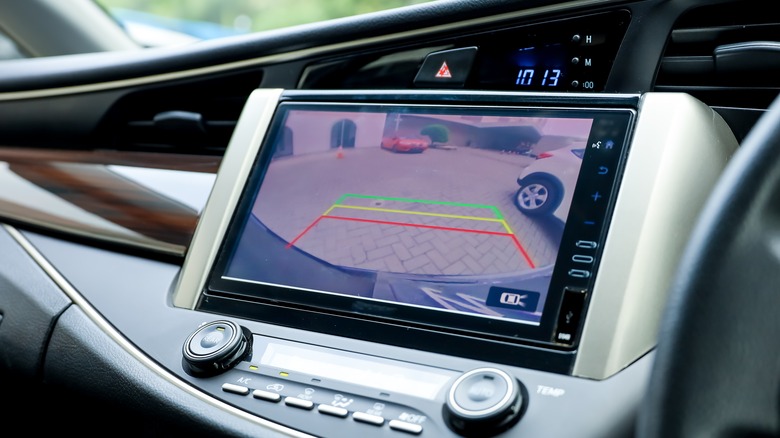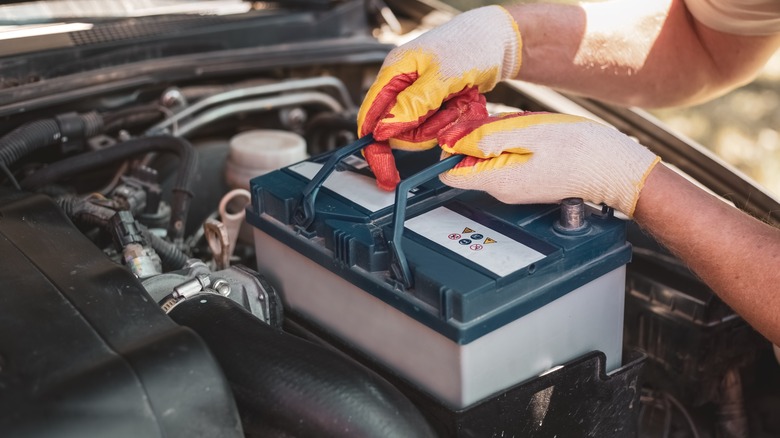10 Reasons Why Your Car Is Making A Beeping Sound
Ideally, your car is as quiet as can be. In fact, some electric vehicles are so quiet they're given fake engine noises (some are truly bizarre). It's natural to hear some revving when you hit the accelerator, but when you begin to notice knocking or humming sounds, it's worth your concern. One problem with many different types of cars is that an incessant beeping will start for seemingly no reason. The solution may be a quick fix, or you may need to take your vehicle to a mechanic to address a deeper problem.
It's worth noting that not every car beeps for the same reason. You may need to dig into your user manual to see what causes your particular ride to beep ad nauseam. Most of the time, cars beep as a safety precaution, letting you know that you've forgotten some vital step before taking off on the road or exiting your vehicle.
Sometimes, a car beeps for a while and then stops on its own without addressing the underlying issue. You never want to take beeps or other strange noises lightly, so be aware of the following causes so you can drive safely with peace of mind.
Headlights turned on
With modern headlights seemingly getting brighter, it seems unlikely that anyone would forget to turn theirs off once they reach their destination. Of course, plenty of folks do, and when it comes to older models, the car may beep at you until you remember to shut it off. It's a safety precaution so that you turn off the lights to avoid draining the battery.
This particular beeping may soon become a thing of the past. Newer vehicles tend to come with an auto shut-off function that turns off all the lights immediately (or within a few minutes) after you shut off the engine. This feature also occasionally makes it so that the lights automatically turn on once you start the car again.
For those driving older cars, it's possible leaving the headlights illuminated is a simple oversight. The driver may have turned them on when it was briefly foggy, but it's cleared up since then. You may not even realize the lights are on if it's daytime when you walk in front of your vehicle, so consider those beeps a godsend when you don't return to a car with a dead battery.
Parking brake engaged
One common driving habit that might be damaging your car is failing to engage the parking brake whenever you come to a halt. Many people only use it when they park on a hill, and when you go a long time without using the parking brake, it begins to corrode, meaning it's more likely to fail when you do engage it on a hill. The phrase "use it or lose it" really applies in this scenario. You also want to ensure you don't drive off with the parking brake engaged, and some vehicles offer a helpful reminder by beeping until you disengage it.
Driving with the parking brake locked on can damage various components within the braking system. It's especially helpful if you activate the parking brake via a button rather than a big handle that's right in front of you. You may not immediately think of disengaging it without a physical presence, so the beeping may save you from driving too far with the brake, causing increased friction.
If your car doesn't beep in this situation, the brake system light may illuminate on your dashboard. It's one of the more common dashboard warning lights, so don't ignore it if it comes on.
Door left open
Left-open doors might be the issue most people are familiar with when a car begins beeping. You may have begun driving only for the car to make loud, annoying noises, which could indicate how one or several of the doors are still at least slightly ajar. The easiest thing to do is for you and your passengers to quickly slam the doors shut to see if that takes care of the beeping.
If the beeps persist, the issue may have been with the trunk or even the hood if you were working on the engine recently. It could be in your best interest to pull off to the side to close the trunk door so that any valuables you have back there don't accidentally go flying out.
Be mindful that the sensor that alerts the car of whether a door is left ajar can malfunction and break over time. This is particularly likely to happen if you were recently in a collision that damaged the door and, by extension, the sensor. It's also possible for the latches to stick over time, so they may just need to be loosened a bit so that the sensor can read that it's a closed door properly.
Keys left in ignition
There are plenty of clever ways to prevent a car from being stolen, from installing a kill switch to parking in a difficulty-to-access location. Fortunately, most cars, especially those made in the modern era, already come with plenty of anti-theft features, such as an alarm that goes off if anyone gets too close, much to the dismay of any nearby neighbors. Additionally, many cars beep when the keys have been left in the ignition, reminding you to grab them so that you don't leave them in place overnight in plain view of any wannabe thieves.
Most of the time, the beeping begins when the engine has been turned off. You may forget to take the keys out, but when you open the door, the car emits a beeping sound. This is an alert to draw your attention to the fact you may have overlooked your keys, so you'll want to grab those before leaving and locking things up.
Even if you're not worried about thieves, you should avoid locking your car with the keys inside. Without a backup set readily available, you may have to call someone to come out and unlock your car for you. Beeping can be annoying, but having to pay someone to unlock your vehicle is irritating on a whole other level.
Seat belt unbuckled
It's hard to overstate how effectively seat belts have prevented vehicle fatalities. Every year, thousands of lives are saved thanks to seat belts, and many injuries could've been less severe had the person worn their seat belt in the first place. It's one of many car features that revolutionized automotive safety forever, and for many on the road today, buckling up comes as second nature. Still, some people may forget to put on their seat belts for one reason or another, and that's why numerous car models now beep to alert you if someone isn't buckled in.
Many driver and passenger seats have sensors so the vehicle's computer knows when a particular area is occupied. If someone is sitting and the seat belt isn't in place, the car will make a loud noise. Some cars even have this alert system for the back seat, so, as the driver, you can be aware if anyone is ignoring the seat belt even if you can't see them.
Granted, this does mean the car may beep because it detects something in a seat even though it's a piece of luggage. Some cars merely beep for a while and stop on their own, but if you want to end the alarm as quickly as possible, it may be easiest to simply buckle your items in, too.
Electrical problems
Vehicles rely on an assortment of electrical components, from wires to sensors, to function adequately. If any of those items malfunctions or breaks down entirely, you could end up in a heap of trouble, which is why many cars beep to alert you of an issue. Instead of closing a door or taking the keys out of the ignition, an electrical problem is more challenging to fix immediately. You may need to bring your vehicle to a mechanic to rectify the issue, and you'll want to mention any noises your car emits.
Non-stop beeping may be the least of your worries, as the sounds could indicate any number of large problems, including faulty wiring, damaged relays, bad sensors, or broken switches. Depending on the exact underlying issue, it's possible your car won't even start or will experience problems when attempting to use certain features while driving.
Such electrical problems can even extend to the horn switch, causing it to short out. This can cause the car horn itself to beep on its own, which will be different from other types of beeps, or when you apply the horn manually, the beep becomes dampened or cuts out unexpectedly.
Low oil or other fluids
You should already have a good idea of how many miles you can go between oil changes. While the typical recommendation has been to get an oil change once every 3,000, most modern vehicles can go longer between refills, often between 5,000 and 7,000 miles. Even though you think you're in the clear, paying attention to any warning signs your car gives you if it needs oil or other fluids sooner is vital. The oil change light on the dashboard may illuminate, and depending on the car you have, it may also emit a loud beeping to really get your attention.
Oil is crucial to keep refilled, as it lubricates and cools many of the moving components within the engine. Coolant is another fluid to keep an eye on, as it also helps regulate the engine's temperature so that it doesn't overheat and fail completely. To be clear, not all vehicles beep when your car's fluid levels are running low, so it's paramount to be aware of any dashboard lights that illuminate or changes within your car's performance.
In the event your vehicle is low on oil, it's easy enough to replace it without going to an auto shop. You just want to make sure to avoid any common mistakes people tend to make when changing their own oil.
Worn-out fuel lines
The fuel line in your vehicle helps transport gasoline from the tank to the engine. These lines are generally made of reinforced rubber, so while they're durable, they don't last forever. The rubber can naturally degrade over time, and if there's any metal within the line, it can corrode, especially if it's constantly exposed to harsh environments. Many modern vehicles are equipped with sensors to monitor the fuel lines to determine if there are any cracks or leaks, and if there are, the beeping will sound off.
These sensors can also determine if there are any air bubbles within the fuel line. These bubbles form from cracks within the line causing air to get through, and they may prevent fuel from reaching the injectors efficiently. With damaged fuel lines, the beeping can be a major asset, as you may not realize there's a problem unless you notice puddles of fuel forming underneath your vehicle.
You can purchase fuel line repair kits to potentially fix the issue on your own. However, if the damage extends into something other than the fuel line, a professional look at it may be more prudent.
Car is in reverse
Depending on the type of vehicle you drive, you should be prepared for it to emit a beeping noise when it's going in reverse. For example, the Occupational Safety and Health Administration requires earth-moving vehicles, which are typically larger and may have an obstructed rearview mirror, to emit beeps that are louder than the ambient noise of the surrounding area. You've likely seen this particular beeping in action plenty of times before if you've seen a garbage truck have to reverse. It's a safety mechanism to inform people in the vicinity of the large truck that it is backing up.
A similar safety feature is in place for electric vehicles that tend to be quieter. Regulations are in place for EVs to beep loud enough for other people in the area to hear so they know the car is in motion. This is also why EVs usually have fake engine noises. It's not just so that the driver still feels like they're revving the vehicle up; it's so pedestrians and other motorists know a car's coming up on them.
While some vehicles beep while in reverse no matter what, others only alert the driver if someone or something gets in the rearview camera. This may be accompanied by an automatic halting feature to try to prevent a collision.
Battery problems
Ideally, a car battery will last three to four years before replacement. However, there are many reasons why your car's battery keeps dying sooner than expected, from installing the wrong size to inadequately addressing poor terminal connections. When your battery starts getting on its last legs, you'll likely notice the light illuminate on the dashboard, and some cars are equipped to beep when the battery's dying.
It's possible you don't need a complete replacement. There are several reasons why the battery light on your dashboard might've come on, as it's possible the issue comes down to a faulty alternator. Either way, you don't want to risk your battery getting drained of power when it's only a few months old, so you should address whatever the problem is promptly.
Not all cars beep when the battery's faulty, but you may hear other unpleasant sounds. It's common to notice a clicking sound when turning on the engine, which suggests an electrical issue preventing the battery from getting the power it needs. Above all else, you want to be as descriptive as possible if you're trying to explain to a mechanic what's going wrong with your vehicle because, in some cases, they can pinpoint the underlying issue on sound alone.

